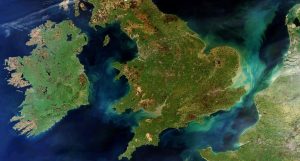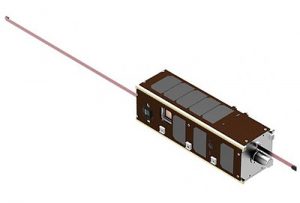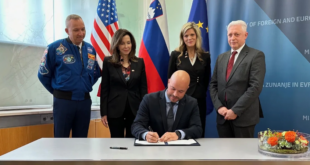
The UK space sector has made great strides over the past several years, and has established a strong network of partnerships throughout the Middle East. Yet the British decision to exit the European Union poses many challenges for the UK space and satellite industry. SpaceWatch Middle East contributing editor Helen Jameson examines the issues.
Ok, so you might not place the UK in the bracket of great space nations, but if you look closely, you realise there is a lot happening on this small island. The UK already has its own thriving space industry. It is home to some of the world’s most renowned satellite service providers, operators, manufacturers, excellent teleport facilities, and great space engineering talent. UK teams have been involved in the development of some truly impressive space feats and, perhaps, the space industry in the UK doesn’t blow its own trumpet as much as it should.
The UK is not pushing to get a man to the moon or to make any grand gestures. Instead, it is committed to focusing on smaller, cheaper investments that will provide good, solid returns. The UK’s core space strengths lie in broadcasting, navigation and manufacturing small satellites, including Cubesats. Though modest by other standards, the sector is also highly ambitious at the same time. However, if the UK is to achieve the ambitious growth outlined in the Space Innovation and Growth Strategy that aims to increase the UK share of the global space economy from six to ten percent by 2030, government investment needs to improve.
A report released in 2015, The Case for Space 2015, by London Economics, revealed some very interesting statistics. The UK space industry directly contributes 0.31 percent of UK GDP, and supports 37,000 jobs. Now these figures may not sound particularly impressive, but when you look at the intrinsic effect that space has on daily lives in the UK, it puts the role of space into perspective. The report found that the UK is heavily dependent upon space, saying that, “All 9 national critical infrastructures rely on space and almost all sectors would be disrupted in the absence of space activities.” The report also stated that the space industry in the UK “punches well above its weight,” as a catalyst for technological advancement and productivity growth. The biggest threat, as already pointed out, is under-investment by the UK government. The report stated that this has fluctuated between 0.15 and 0.02 percent of GDP over the last 15 years.
Brexit Worries
The recent ‘Brexit’ vote has also brought uncertainty, not just over the UK itself, but over the entire UK space sector. As I sit here writing this today, the Brexit story has taken yet another twist with the news that the British High Court has ruled that the Prime Minister cannot trigger Article 50, required to start the Brexit process, without the consent of Parliament. The UK government will appeal and, if the appeal is unsuccessful, it will be for MPs to decide when the Brexit process will begin.
The space workforce in the UK is comprised of many highly skilled European workers and it is essential that action is taken to ensure that these jobs and skills remain in the EU. Though the UK has stressed that it is very much ‘open for business’, it is essential that UK access to EU-funded space programmes such as Galileo and Copernicus is retained. Not only this, but the European Union’s Horizon2020 programme – an 80 billion Euro high technology fund – is invaluable in terms of research and innovation support for UK space start-ups.
The trade association for the UK space industry, UK Space, stated, “We request the UK government seeks bilateral agreements on these programmes as they support UK industrial growth and job creation in the global markets of satellite navigation, earth observation and related research. If investments in research, technology and application development cannot be obtained bilaterally with the EU, then it is vital that nationally targeted financial investment from the reallocation of funding previously spent on the UK’s EU membership should be made available.”
The UK’s relationship with the European Space Agency (ESA) will not be affected, as non-EU states are members of the Agency. However, what is critical is that the UK maintains its leading position in ESA programmes and other EU initiatives and that it plays to its strengths.
The Principia Effect
This year by far the most well-publicised and most followed space event in the UK was the journey of UK astronaut, Tim Peake, on the ESA Principia mission on board the International Space Station (ISS). The whole nation was glued to their televisions and mobile devices watching the launch, his space walk and his return to Earth in the Soyuz capsule.
Peake Tweeted his six-month experience on the ISS. He kept in touch with the nation on a daily basis. He even ran the London Marathon on a treadmill on the space station, and he has to be given credit for re-engaging the nation with space. This renewed appetite is something that the UK Space Agency is keen to develop.

“There has always been an enthusiastic following of space in the UK, but it seems to have reached new heights with the support for Tim’s mission to the ISS,” said a UK Space Agency spokeperson. “In addition to the 20,000 that gathered together in each of the national capitals to celebrate the launch, we believe that we reached more than 24m [million] with coverage of the launch across all major news outlets. We hope that we can take that enthusiasm and encourage people to look at jobs in the space businesses, generate innovative new start-ups, or even just get involved with their local space community.”
The UK Principia Education programme has reached well over 1,000,000 school-aged children and the number will continue to increase. 30 projects, spanning the whole curriculum and age ranges, have provided teachers with the tools to bring Tim Peake’s mission into the classroom, maximising its impact on young people.
This is the biggest education programme ever undertaken for an ESA astronaut, and one of the largest STEM engagement projects ever implemented in the UK. This has been achieved through collaboration between the UK Space Agency, ESA, and a large number of education partners in the UK, including the European Space Education Resource Office (ESERO) in the UK.
These projects have created a bank of resources that will be available for many years to come, and many of the projects will continue in to the 2016/17 academic years, further building the legacy of the mission for young people. Some projects will be continued with other ESA astronaut flights.
Entrepreneurial Spirit
The UK is alive with start-ups that want to use space to make a difference to our everyday lives. This element of the UK space industry is going through a very exciting time with many initiatives pushing new UK space talent and enabling them to find investment for their innovative projects.
One such project is Space Mission UK, a series of entrepreneurial missions that are specifically designed to support UK startups with their ambition to build world-leading space and satellite application companies. Missions 1 and 2 took nine UK companies to Utah, Silicon Valley, and Los Angeles in the United States in August and November 2015. The missions provided the start-ups with visits to events such as the Small Satellite Conference in Utah, meetings and networking opportunities with big names in the space sector such as Virgin Galactic, NASA’s Jet Propulsion Laboratory (JPL), and Lockheed Martin. It’s a unique opportunity supported by the UK government that can enable start-ups to gain knowledge and assistance as they make their space dreams a reality. In the coming weeks, Mission 3 will take nine space companies back to California to continue their pursuit of success in the sector.
Collaboration is Key
Technology transfer and partnership with other national space agencies is a priority for the UK. Just recently, the UK Space Agency closely collaborated with the Algerian Space Agency (ASAL) on the AlSatNano programme. This was a joint educational and technology demonstration programme born through the signing of a Memorandum of Understanding (MoU) between the two countries in 2014. A specific action identified following the MoU was the establishment of a joint CubeSat development programme to be delivered by the Surrey Space Centre (SSC) at the University of Surrey, for Algerian graduate students. The UK Space Agency has supported the satellite development and student programme, and ASAL has provided the launch and ongoing operations.
Access to space technology through traditional space missions remains relatively limited for developing nations due to their high cost, but nanosatellite missions offer the possibility to overcome this constraint by providing access at significantly reduced cost. The training and knowledge transfer, delivered by Surrey Space Centre to Algerian students and Algerian Space Agency engineers and satellite operators, is building long-term technological capability in a developing space nation and has delivered Algeria its first CubeSat mission.

The satellite was built using hardware sourced almost exclusively from UK suppliers, and half of its volume has been made available to the UK CubeSat community as a free technology demonstration flight opportunity for self-funded payloads, via an open call and competitive selection process. The payload suite includes an imager (C32D), a deployable and retractable boom (AstroTube), and ultrathin solar cell technology test bed (Thin Film Solar Cell).
Following successful launch and deployment on 26 September 2016, the spacecraft platform has been commissioned, showing good in-orbit performance. The Algerian and UK teams are now working closely together throughout payload commissioning. These working arrangements between mission partners provide the potential for future collaborative opportunities as Algeria develops its domestic space programme, and globally showcase the capability of UK technology in offering low-cost solutions for remote sensing and scientific instrumentation.
The cooperation with Algeria illustrates just what can be achieved through collaboration with other nations and the UK has forged partnerships in the Middle East region and beyond.
The UK Space Agency is promoting international cooperation through agreements and joint projects with countries as diverse as Kazakhstan and Algeria, Tanzania and the UAE, while encouraging foreign direct investment from global space companies like Thales Alenia Space, Lockheed Martin, Deimos, and ComDev.
The UAE’s Mohammed Bin Rashid Space Centre (MBRSC) and Deimos Space UK partnered up in July 2015 on a project entitled Smart Application for feature extraction and 3D modelling using high resolution satellite imagery (SAFIY). This project, initiated through the UK Space Agency’s International Partnership Space Programme (IPSP), uses EO data to monitor and detect changes in vegetation, water, road networks, and building to back up the Dubai ‘Smart Government’ initiative. By developing mapping applications that use the DubaiSat-2 and Deimos-2 optical data, routine tasks performed by government agencies are made more efficient. The UAE as a whole is investing in the space sector as they can see the true benefits that it can bring, on many different levels. It has certainly made its space ambitions clear with its Emirates Mission to Mars now underway, and there is a true recognition that partnerships such as the one with the MBRSC facilitate knowledge transfer and sharing of experiences so that countries can grow and develop their space industries.
This partnership with MBRSC was followed in February this year by a further MoU with the UAE Space Agency. The MoU allows for extensive cooperative activities in the field of space between the UK and the UAE, including partnerships in scientific missions and outreach efforts. In addition, the development of the next generation of space talent is to be nurtured through the MoU.
The creation of a National Space Academy will deliver intensive science, technology, engineering, and mathematics (STEM) education curriculum support for Gulf states through secondary school student master-classes and intensive science teacher training both in-country and in the UK, based on the successful UK National Space Academy model. This is laying the foundations for the establishment of a sustainable Gulf States Space Academy model delivered in partnership with the UAE Space Agency and other agencies in the region. The four-year programme will start in the UAE and eventually be expanded across the GCC.
UK Spaceport
Plans for the UK’s very own spaceport have also recently hit the headlines again. At present, there is a shortlist of potential sites for the spaceport that include: Campbeltown, Glasgow Prestwick, Stornoway, Newquay, Llanbedr, and RAF Leuchars as a potential temporary facility. The spaceport would effectively be an extremely long runway that would allow the UK space sector to exploit the already strong small satellite market by introducing orbital and sub-orbital commercial launches. Five industrial teams have been contracted to submit feasibility studies, including Airbus Safran Launchers, Deimos Space UK, Lockheed Martin, Virgin Galactic, and Orbital Access. The studies are due for submission later this month.
Playing to its Strengths
The UK’s space story is one of great achievement. Its rapid growth and the growing number of innovative companies coming out of the nation is testament to this. The establishment of the UK Space Agency in 2011 gave the space community in the UK more focus, and the initiatives that are coming out of the Agency are enabling valuable international collaboration, not to mention the promotion of space in the UK itself and the development of the next generation of space engineers.
However, with Brexit looming, and a lack of real investment in space in comparison with other UK industries, funds must be assured from both government and private pockets, to ensure that the UK can maintain its position in Europe and the rest of the world. The UK space sector already exports most of its products, but these exports need to increase further.
As for the UK Space Agency, it is entering into an incredibly important period. The UK’s Civil Space Strategy is coming to the end of its current remit and now needs a critical review to decide where the sector is headed.
In the next few weeks, at the ESA Council of Ministers meeting on 1 and 2 December 2016 in Switzerland, The UK Space Agency will be negotiating the UK contributions to ESA for the next four years. It will be prioritising its investment across the spectrum from science missions to nearer market commercial innovation, focusing on those investments that will have a real return for UK industry and academia.
Investment priorities for 2016 will include new ground-breaking science, missions to help understand our changing planet, better commercialisation of space technology and services, and a strengthened ESA presence in the UK.
As uncertain as things are in the UK at the moment, there can be no doubt of its capabilities in space.
Let’s just hope that the investment is made available to ensure that space is upheld as one of the UK’s most important sectors, and given the opportunities that it needs to flourish further.
Original published at: http://spacewatchme.com/2016/11/uk-space-commercial-scientific-excellence-political-uncertainty/
 SpaceWatch.Global An independent perspective on space
SpaceWatch.Global An independent perspective on space

